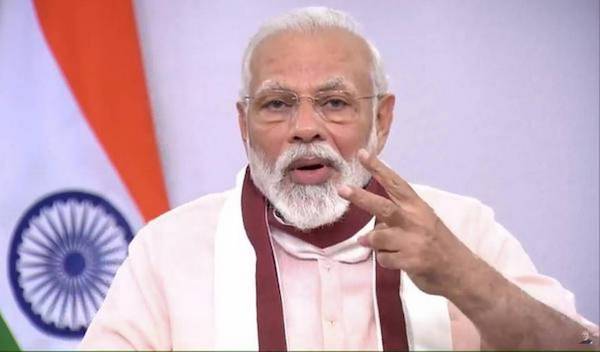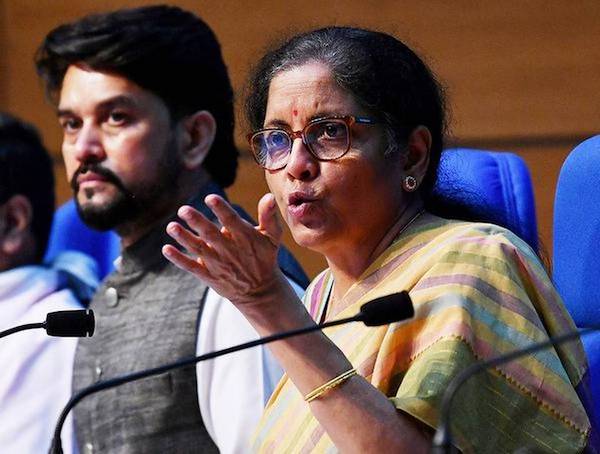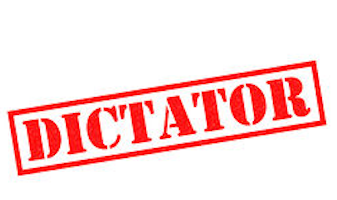
Gives a call for being ‘vocal for local’ and for self-reliance
Prime Minister Narendra Modi on Tuesday, May 12, said a new-look Lockdown 4.0 beyond May 17 was in the offing, while announcing an economic stimulus package for ₹20-lakh-crore (estimated at 10% of the GDP), with a clearly defined leap towards economic reforms that will, in his words, lead to Atmanirbhar Bharat, or a self-reliant, resilient India.
This amount includes packages already announced at the beginning of the lockdown incorporating a slew of measures from the RBI and the payouts under the Pradhan Mantri Garib Kalyan Yojana.
Addressing the nation on television, Prime Minister Modi said the whole world was reeling from the crisis engendered by the COVID-19 pandemic, as was India. In this crisis, however, India had had an opportunity to look at systems and institutions that were in existence before the crisis hit and how they crumbled. “We have been hearing for many years that the 21st century will be India’s century, and this crisis is, I believe one that carries a message, that we have to move forward not just to combat the crisis but to prevail,” Mr. Modi said. “That can happen when we are self-reliant.”
He gave the example of India’s ramped-up capacity in producing Personal Protection Equipment (PPE) kits and N-95 masks required by medical personnel and frontline health workers to illustrate his point that India could achieve this.
“When the first case hit us, we didn’t produce either of these things. Now, within weeks we have the capacity to produce 2 lakh of PPE and 2 lakh of N95 masks every day,” Mr. Modi said.
Clarifying that by self-reliance he did not mean insularity and suspicion of the world as in the past but embracing the world in the spirit of Vasudhaiva Kutumbakam (the world is one family).
“Self-reliance in this sense is neither exclusionary nor isolationist, it is for helping the world, with our actions. In the past whenever we have acted it has impacted the world in a positive way — be it solving the Y2K riddle in 1999, or our campaigns against open defecation, tuberculosis and polio,” Mr. Modi said.
He said that the new edifice of this self-reliant India would be based on the five pillars of the economy, infrastructure, demography, technologically driven systems and to strengthen demand and supply chains, with the supply chains being based on local sourcing.
“In the past few days we have seen how local supply chains and shops are the only things that have helped,” he said.
The Prime Minister said the economic package would not be based on incremental changes, but a quantum leap in bold reforms with regard to land, labor, law and liquidity.
“In the last few days we have seen the suffering of our workers, migrant labor, street vendors and daily wagers and farmers. This package will be aimed at them. It will be aimed at the honest taxpayer, at our industry that makes its capital work,” he said.
Mr. Modi signed off on a strong note to buy local, and to be vocal about it. “Local production helped us in this crisis, and when you look at several global brands, they began as local but were marketed and raised to a global level. We have to do the same with our produce. We need to be vocal about local,” he said. “We must and will make India self-reliant,” he said.
A day after PM Modi made the announcement, the Finance Minister Nirmala Sitharaman, on May 13, announced a ₹3 lakh crore collateral free loan scheme for businesses, especially micro, small and medium enterprises (MSMEs), as part of a ₹20-lakh-crore economic stimulus package to deal with the COVID-19 pandemic.
For salaried workers and taxpayers, some relief was provided in the form of an extended deadline for income tax returns for financial year 2019-20, with the due date now pushed to November 30, 2020. The rates of tax deduction at source (TDS) and tax collection at source (TCS) have been cut by 25% for the next year, while statutory provident fund (PF) payments have been reduced from 12% to 10% for both employers and employees for the next three months.
Apart from MSMEs, other stressed business sectors which got attention were non-banking finance companies (NBFCs), power distribution companies, contractors and the real estate industry.
MSMEs will get the bulk of the funding. The ₹3 lakh crore emergency credit line will ensure that 45 lakh units will have access to working capital to resume business activity and safeguard jobs, Ms. Sitharaman said. For two lakh MSMEs which are stressed or considered non-performing assets, the Centre will facilitate provision of ₹20,000 crore as subordinate debt. A ₹50,000 crore equity infusion is also planned, through an MSME fund of funds with a corpus of ₹10,000 crore.
NBFCs, housing finance companies and microfinance institutions — many of which serve the MSME sector — will be supported through a ₹30,000 crore investment scheme fully guaranteed by the Centre, and an expanded partial credit guarantee scheme worth ₹45,000 crore, of which the first 20% of losses will be borne by the Centre.
Power distribution companies, which are facing an unprecedented cash flow crisis, will receive a ₹90,000 crore liquidity injection. Contractors will get a six-month extension from all Central agencies, and also get partial bank guarantees to ease their cash flows. Registered real estate projects will get a six-month extension, with COVID-19 to be treated as a “force majeure” event.

Photo Credit/ Shiv Kumar Pushpakar
On May 14, the Finance Minister announced another round of stimulus.
The Centre will help create affordable rental housing for the urban poor and provide relief worth ₹1,500 crore to small businesses through an interest subvention scheme, apart from extending credit for street vendors, farmers, and middle-class housing.
Apart from free food for migrant workers, these are the major highlights of the second tranche of the Atmanirbhar Bharat Abhiyan stimulus package, announced by Finance Minister Nirmala Sitharaman on Thursday, May 14.
Noting that migrant workers and other urban poor face difficulties in finding affordable housing, the Finance Minister said a scheme to build rental housing complexes through public private partnership mode would be launched under the existing Pradhan Mantri Awas Yojana (PMAY) scheme. Both public and private agencies will be incentivized to build rental housing on government and private land, while existing government housing will be converted into rental units.
The credit linked subsidy scheme for lower middle class housing under PMAY will also be extended by one year to March 2021, and is likely to benefit 2.2 lakh more families, said Ms. Sitharaman, expressing the hope that this would also create jobs and stimulate demand for the steel, cement and construction industries.
Street vendors who have been hit hard by the lockdown will be given access to easy credit through a ₹5,000 crore scheme, which will offer ₹10,000 loans for initial working capital.
The scheme will be launched within a month and will benefit 50 lakh vendors, said the Finance Minister.
Small businesses who have taken loans under the MUDRA-Shishu scheme, meant for loans worth ₹50,000 or less, will receive a 2% interest subvention relief for the next year, which will cost the government ₹1,500 crore.
The Centre plans a drive to enroll 2.5 crore farmers who are not yet part of the Kisan Credit Cards scheme, along with fish workers and livestock farmers, and provide them with ₹2 lakh crore worth of concessional credit. NABARD (National Bank for Agriculture and Rural Development) will also extend additional refinance support worth ₹30,000 crore to rural banks for crop loans, Ms. Sitharaman said.
“The only fiscal outlay in today’s announcements are the ₹3,500 crore for food grains to migrants and ₹1,500 crore for the MUDRA loanees. So only ₹5,000 crore is actually coming from government coffers, while the rest are credit-based measures,” said Himanshu, an economist at Jawaharlal Nehru University’s Centre for Economic Studies and Planning.
Terming the government’s approach as “stingy and half-hearted”, he noted that at a time when demand is down, any moves to provide liquidity are not going to help, adding that putting cash in people’s pockets would have been a better approach.
“Banks are parking money with the RBI (Reserve Bank of India), so the problem is not liquidity, but rather the appetite of people to take credit at this time,” he said. “Effectively, the burden of revival has been passed on to the people most affected by the lockdown,” he added.
Meanwhile, Congress spokesman said Govt’s ‘jumla package’ fell way short of what PM Modi had promised.
A senior spokesperson of the party, Anand Sharma, said the country believed that Prime Minister Narendra Modi was serious when he made the “dramatic” announcement of giving 10 per cent of the GDP as a package to revive the economy and support workers and migrant laborers, and that expectations had soared.
“The Finance Minister’s announcement dashed all hopes,” he said.
Congress’ chief spokesperson Randeep Surjewala said Finance Minister Nirmala Sitharaman’s announcements were nothing but a “jumla package”.
Senior party leader Ahmed Patel said: “It is not an economic package. It is an empty package wrapped with speeches since the last three days.”
Congress spokesperson Manish Tewari pointed out that Finance Minister Nirmala Sitharaman articulated the second tranche of the bailout or economic package that this government had conceptualized.
“It is unfortunate that the entire press conference (of Sitharaman) was a classic display of arrogance, ignorance and insensitivity,” he said addressing reporters via a video link.
“We expected that the Finance Minister would come out with what the government is doing to ferry the migrants who are walking on the roads back to their homes safely. But nothing like that happened,” Tewari said.
(With inputs from agencies)





Be the first to comment